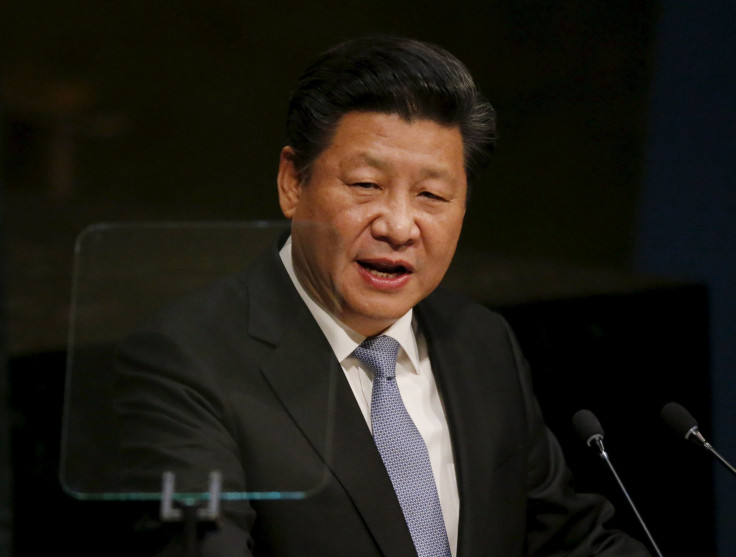China Vows To Fight Terrorism And Bring Killers Of Chinese Hostage To Justice

SHANGHAI -- China has confirmed that one of the two hostages reported to have been executed by the Islamic State group in the Middle East was a Chinese citizen, Fan Jinghui. President Xi Jinping said Thursday that he had sent condolences to Fan’s family, and said China would “fight against any violent terrorist attacks that challenge human civilization.”
Xi, who was attending the Asia Pacific Economic Cooperation (APEC) summit in Manila, said: “Terrorism is a universal enemy of mankind,” Associated Press reported. Meanwhile, Chinese citizens responded angrily to the news online.
ISIS said in September that it had captured Fan, thought to be aged 50, along with Norwegian hostage Ole Johan Grimsgaard-Ofstad. Relatively little is known about him or what he was doing in the region -- he was described by ISIS as a freelance consultant from Beijing, while media reports said he was a self-styled “wanderer” and former teacher who had once set up an advertising agency.
Chinese Foreign Ministry spokesman Hong Lei said that Beijing had tried “to rescue the hostage with all-out efforts since the kidnapping happened” -- but said that “the terrorism group ignored human conscience and morals” and Fan had been "cruelly murdered." Hong said China was “greatly shocked” by the killing, and the Chinese government would "do all it can to bring the killers to justice."
However, analysts said it was not clear what action Beijing would take: China has generally sought to avoid involvement in international conflicts, and has been critical of western intervention in Syria and Iraq. The official Global Times newspaper said in an editorial this week that the world should be careful not to fall into ISIS's trap, by taking drastic action in the Middle East that might alienate and radicalize more members of Muslim communities around the world.
“Beijing might provide financial and other indirect support to the anti-terrorism, anti-ISIS crusade, but it is most unlikely to furnish military support,” Willy Lam, a specialist on Chinese politics at the Chinese University of Hong Kong, told International Business Times.
Nevertheless, China’s leaders may face pressure from public opinion to be seen to be backing up their words with actions: Among tens of thousands of comments on local news portal Sina.com on Thursday, one of the most praised said simply: “Destroy ISIS.” However another post -- possibly reflecting an official line -- said China’s people should "believe in the wisdom of the government," and "must not let our current fury lead terrorists who are targeting the west to turn the barrel of their gun towards us." Another added, "Some people want the government to light a fuse and set itself on fire, so that we turn into France."
China already faces its own challenges from Islamic separatists, who it says are linked to ISIS, in its north-western region of Xinjiang. Beijing says a Xinjiang group known as the East Turkestan Independence Movement (ETIM) is behind a series of violent attacks in the country over the past two years -- including an explosion in Tiananmen Square in 2013, which killed two passersby and injured 39, and a knife attack at a railway station in the southwestern city of Kunming in March 2014 that left 31 dead.
After the Paris attacks last week, Chinese leaders upped their public criticisms of ETIM, calling on the international community to recognize it as a threat to world peace. The group has previously been listed as a terror organization by the U.S. State Department, but does not feature on its latest main list of such groups. Chinese officials also said this week that China was a potential target for future ISIS-related attacks, and vowed to step up security precautions.
Yet observers say that worries about attacks on its own soil may make Beijing even more wary of direct participation in any international action against ISIS. And in a possible sign of official anxiety, some reports Thursday morning said searches for Fan's name were being blocked on Sina Weibo the Chinese equivalent of Twitter.
However, the Chinese University of Hong Kong's Willy Lam said that if the execution was confirmed, Beijing would likely use it as further justification for its current crackdown in Xinjiang, which the authorities have said is aimed at terrorists and religious extremists. The campaign, which Chinese media said in May had led to the cracking of more than 180 gangs of criminals, has been criticized by some human rights groups, who say the government's tough approach risks alienating more people in the mainly Muslim region.
© Copyright IBTimes 2024. All rights reserved.






















